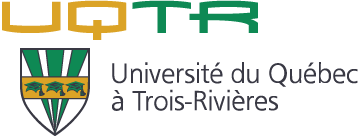English
The Université du Québec à Trois-Rivières is located halfway between Montréal and Québec (an hour and a half's drive in either direction from Trois-Rivières).
One of the university's most attractive features is its relaxed, informal atmosphere where students and professors work closely together during teaching and research activities.
The university offers its 15,000 students a quiet, pleasant environment including a large campus with plenty of green open spaces. It also assures them a first-rate education through the dedication and specialized skills of the professors and the availability of advanced techniques. At UQTR, learning and research involve the same hard work as anywhere else - but under far more pleasant conditions.
For the students who don't speak French, it is recommended that they register at the École Internationale de Français, a French immersion school of the Université du Québec à Trois-Rivières. A short class with the ÉIF will help them to integrate into their other classes.
Admission requirements
International students who wish to register in one of the university's post-graduate programs must have either a bachelor's degree, professional qualifications based on the completion of an advanced study program of at least five years or a diploma recognized as the equivalent of a bachelor's degree from the University.
The University may at any time impose additional courses upon students whose previous training does not meet its standards for equivalency. An official French translation, validated by the Canadian embassy of the student's native country, must accompany each document that is not written in either French or English.
Documents indicating all the prerequisites of admission to the various programs are available for students at the registrar's office. They may be requested in writing or by E-mail.
Information and assistance
Assistance is available to students from the personnel in charge of various services: reception, information, personal counselling and financial aid.
The main concern of persons responsible for these services is to help students solve any problems that may occur and so facilitate their integration into university life.
For more information :
819 376-5011 or 1 800 365-0922
or
E-mail
Fax : 819 376-5012
The
Université du Québec à Trois-Rivières
3351, boulevard Des Forges,
Casier postal 500,
Trois-Rivières (Québec) G9A 5H7 CANADA
The Quebec University System
In the province of Quebec, the academic year is divided into three terms - autumn, winter and summer - each of which lasts 15 weeks.
To obtain a degree, a student must pass each course of his or her chosen program. There is a "one-course-at-a-time progression" policy. That is, should a student fail a particular course, he or she is obliged to repeat this course only and not the entire term.
University programs consist of study at the undergraduate, master's and doctoral levels (premier, deuxième et troisième cycles). The undergraduate level leads to the obtaining of various certificates and bachelors' degrees or to a first-cycle doctorate at the end of a program of at least five years of university training.
The master's program includes 45 credits and lasts at least three terms. The master's degree with a thesis (type B) involves the writing of a thesis and helps students develop and refine their research skills. The master's degree without a thesis, or the professional master's (type A), aims to develop practical skills. It includes various learning activities and requires the student to submit a report concerning his or her research studies and tutorial work. International students who wish to register in a master's program must have their undergraduate degree recognized as the equivalent of a UQTR bachelor's degree.
The doctorate consists of 90 credits and lasts at least six terms. Its purpose is to train researchers by providing them with an in-depth understanding of a particular subject or of a broader field of research. The doctorate includes 70 to 90 research credits. In addition, a student must present a thesis that adds new knowledge to his or her chosen field and paves the way for new applications.
